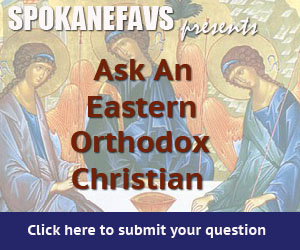What would you like to know about the Eastern Orthodox Christian faith? Submit your question.
Can you explain the calendar your church uses? I know it’s different than most Christian churches.

In 1582, Pope Gregory XIII of the Roman Catholic Church replaced the traditional Julian calendar in the West with a new calendar, called the Gregorian calendar. This new calendar was more astronomically correct and is the calendar used by most Christians of the world today.
The Christian East (The Orthodox Church) continued using the Julian calendar until 1923, when most of the Orthodox jurisdictions changed to the Gregorian calendar for only fixed feast days. Some examples of fixed feast days are Christmas or the Dormition of the Theotokos. However, all Orthodox have continued using the Julian calendar for the calculation of Easter (known in the Orthodox Church as Pascha). Other related movable feasts determined by the date of Easter are Palm Sunday (a week before Easter), The Ascension (40 days after Easter) and Pentecost (50 days after Easter).
The word Pascha (Πάσχα) which is called Easter in the West, is the Hellenized form of the Jewish word Pesach, (or Phaska), which is defined as passage or Passover.
To calculate the date of Pascha (Easter) the date must be:
- determined only by the Julian calendar, not the Gregorian calendar;
- after the Jewish holiday of Passover;
- on the first Sunday after the first full moon after the Spring Equinox, which for this purpose is a fixed date of March 21.
In the Gospel of John, the chronology sequence of events of the Lord’s crucifixion and burial was on the day before the Passover, and his resurrection was on the day after. For churches of the West who follow the Gregorian calendar, Easter can often times take place before the Jewish Passover and for what it’s worth is historically and chronologically inaccurate. Orthodox Easter is always after the Jewish Passover as it always was in the West before 1582.
The Orthodox adhered to the rules and practices of the early Christian Church set forth by the First Ecumenical Synod (Council), held in Nicaea in 325 AD. At this council were gathered all the known bishops of the known Christian world representing the one, holy, catholic (meaning universal), and apostolic church. It was unanimously agreed upon and required that Pascha must take place after the Jewish Passover to preserve the biblical sequence of Christ’s Passion. This practice and celebration of Jesus’ Resurrection was celebrated on the same dates by all Christians from 325-1582. This same council of Nicaea together with the Holy Spirit of God assembled and unanimously declared that all the Scriptures of the New Testament as the Word of God, the Bible.
For Orthodox Christians, the celebration of Pascha (Easter) the Feasts of Feasts, the very center and heart of the liturgical year reveals the mystery of the eighth day. Pascha is not merely a historical reenactment of the event of Christ’s Resurrection, but a way to experience the new creation. In the celebration of these feasts, we occasionally experience a foretaste of the new and unending 8th day that we’ll all participate together in the Kingdom of God.
This year the date of Orthodox Pascha (Easter) does not coincide with the celebration of Western Easter and is celebrated a week later on April 12.






Thoughts and comments for all Orthodox and Greek Catholic Christians.
Since the adoption of the Gregorian Calendar by some of our Churches in 1923, whereby we Gregorian users of Orthodoxy and several Greek Catholics revert back to the usage of the Julian Calendar for Pascha in order to maintain our unity and common celebration of the Feast; why doesn’t or rather, why can’t we do the same for the Feast of the Nativity?????
I don’t see any issues or problems with it. I believe the majority of we Gregorian users (laity) outside of Pascha would prefer or have no objection to furthering our unity and manifesting it to the world.
It is scandalous enough that even though we have 14 Autocephalous Churches all in communion with one another; our Hierarchs refuse to unite or even further discuss this very important matter. It isn’t rocket science folks?
Maybe it is time for us at the bottom rung of the ladder so to speak, to initiate the change?
History has shown us throughout centuries that most changes that were made by the Church began at the lay level and worked its way up to the highest rungs of the Church who eventually heard and accepted the voice of the laity. After all, we form the backbone of the Church; financially, spiritually and listening to and following the teachings of the Faith presented to us by many of the Great Saints and Church Hierarchs both in the past and present.
Respectfully!